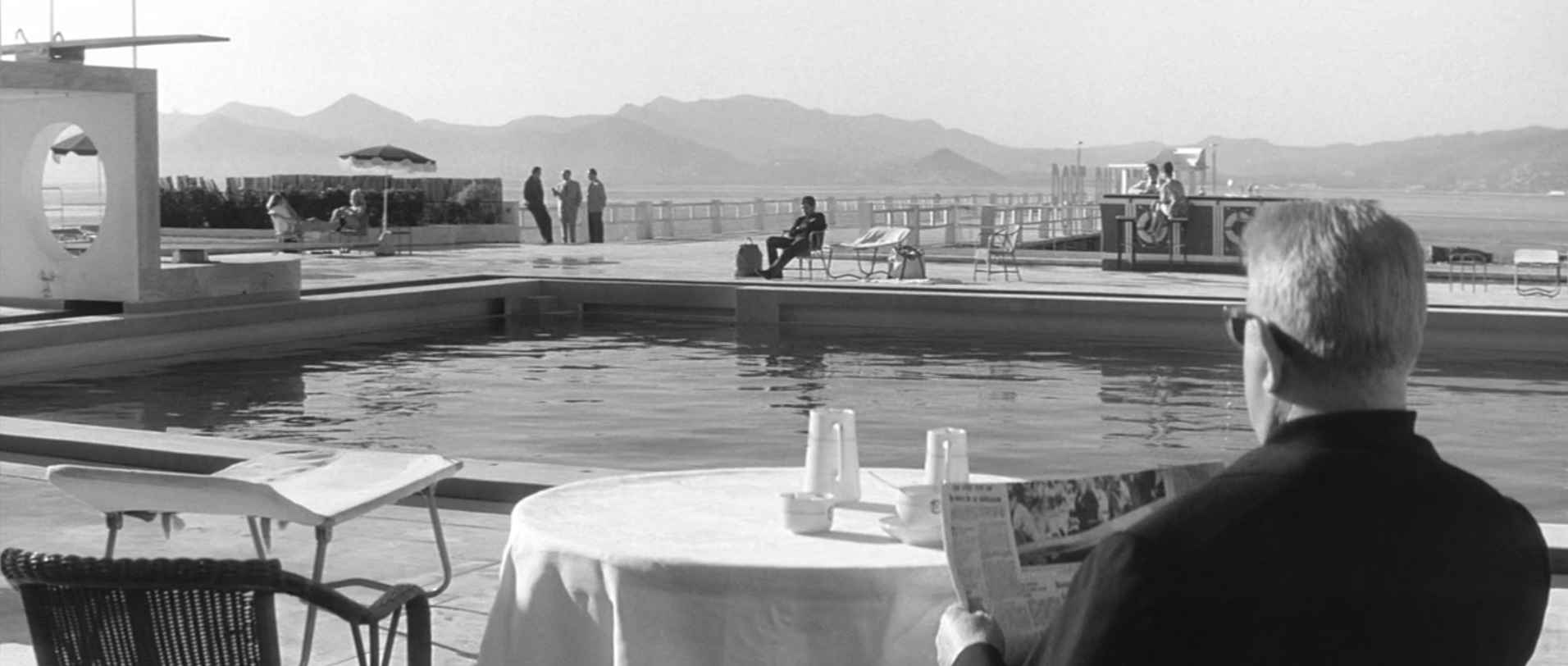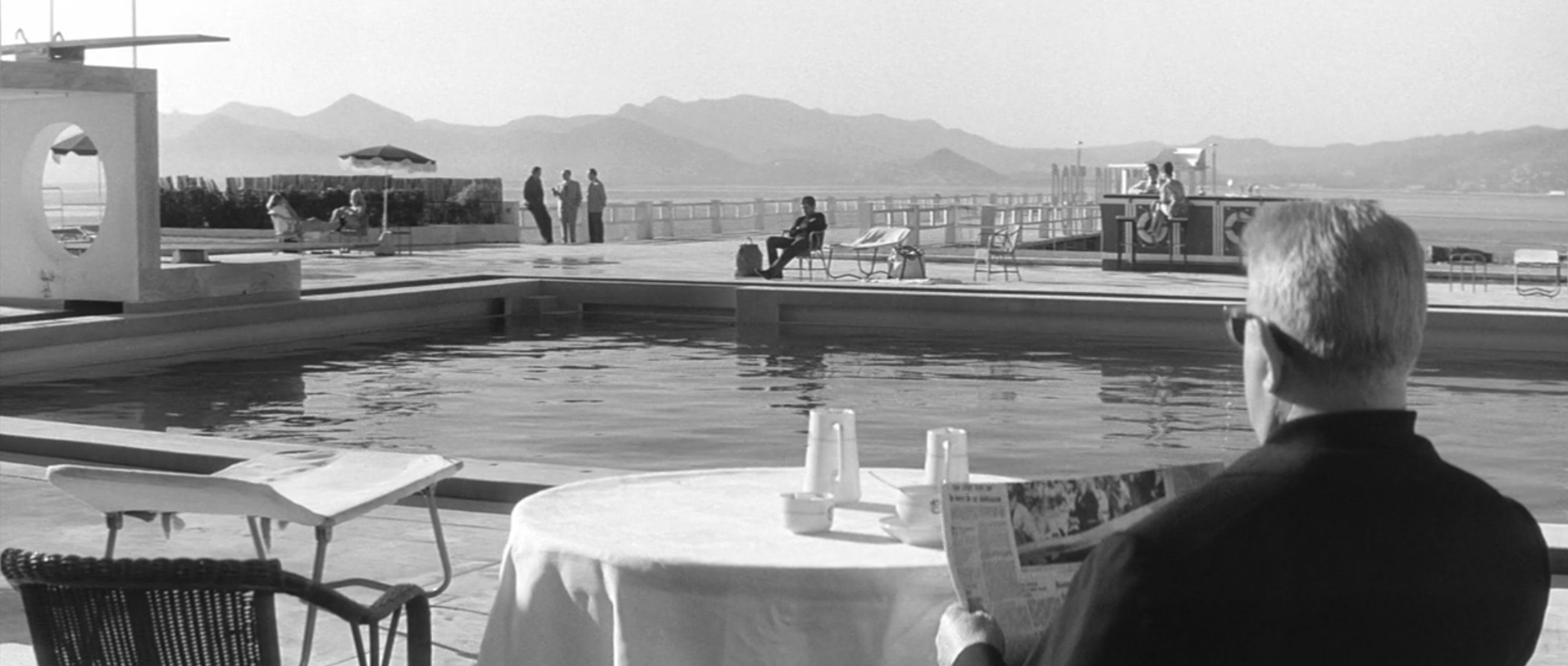Movie Log: Blink Twice, Hold-Up, and LE SAMOURAÏ

We lost two great actors a few weeks ago: Gena Rowlands and Alain Delon. Both were known for careers that mixed popular hits with award-winning prestige dramas. It may take me a while to get some Gena Rowlands in my "queue", but I happened to have something by Alain Delon ready to go.
Meanwhile, John Woo, the Hong Kong action auteur who moved to Hollywood in the '90s and never turned back has a new version of his most iconic Hong Kong film out this week. I have not seen The Killer (2024) yet, but I'm excited that we have the master of action back. I decided it was time for a rewatch of the original, and this led to a pick that was inevitable on my personal list of Essentials.
I changed "File Under" to "Reason to Watch" in the movie info sections. The old system was based around ongoing 'series' but pretty soon I realized I don't always have a 'series' tag to file a movie under. "Reason to Watch" is more utilitarian; I want to give insight into how/why I select movies for my queue.
Blink Twice
2024, USA, d. Zoë Kravitz, 1h42m, ****
Who's In It: Channing Tatum, Naomi Ackie, Alia Shawkat, Adria Arjona, and several others I won't spoil
Reason to Watch: Zoë Kravitz' first feature as writer/director
Naomi Ackie and Alia Shawkat play catering servers at a gala who meet one of the richest men in the world and get whisked away to his private island, a paradise where everything is a little too perfect.

On first watch, the build-up may seem a little bit slow, but every shot counts in Zoë Kravitz' first movie as writer/director. Her work is stylish, full of layers of symbolism, and bold flourishes. Not since Get Out have we seen a debut feature that worked so well as a thriller, while also being thematically rich. The content warning that appears before the film says more about the revolution Zoë Kravitz wants to bring to the industry - listening to voices that have long been ignored - than how bad the most graphic scenes actually are in the film. They are disturbing, but not so much as to spoil what is still a great pulp thriller on its surface.
Hold-Up
1985, Canada, d. Alexandre Arcady, 1h54m, ***
Who's In It: Jean-Paul Belmondo, Kim Cattrall, the city of Montreal
Reason to Watch: An earlier adaptation of "Quick Change"
I recently watched a Bill Murray movie based on a novel called "Quick Change", and it really felt like everything after the opening heist was heavily changed to be about NYC. I don't know where the book is set, but I can't imagine it being put together the same way. I soon discovered there was an earlier French-Canadian adaptation set in the city of Montreal. It pairs an aging Jean-Paul Belmondo (of French new wave films of the '60s) with young Canadian actress Kim Cattrall (heard of her?).

While not a great movie, this was a major improvement on Quick Change (1990), although maybe some of my enjoyment came from seeing how smartly some of the differences improved the flow of the story. While the opening heist is a little too long, after they getaway this version has a twist which puts them immediately on the chase from more than just the police. I can't quite tell whether Belmondo is not wearing full face makeup out of personal vanity, or if it's a choice for his lazy character: the key to his success is the coolness of not quite caring if he gets caught.
There are a few scenes later in the movie that don't make logical sense, but by then everything has proceeded with basic storytelling competence so you can roll with it. It's a comedy, but not in the sense of big jokes and laughs - just the amusement of a series of increasingly madcap events. Montreal is a beautiful city, and this is as good as it has ever looked. There are some low-key spectacular stunts involving a big rig and a schoolbus; the driving stunts were handled by a veteran team that handled the James Bond franchise from From Your Eyes Only to Goldeneye.
The Killer
1989, Hong Kong, d. John Woo, 1h51m, ****
Who's In It: Chow Yun-Fat, Danny Lee, Sally Yeh
Reason to Watch: Classic revisited, John Woo
It's probably been almost 20 years since I watched John Woo's classic Hong Kong action films, so I was past due for a rewatch. He loved cinema and drew from American noir crime films of the 1940s, French neo-noir from the 1960s, and Martin Scorsese's crime films from the 1970s. But he crafted his own unmistakable style which would in turn shape Hollywood in the 1990s, Korean action, Japanese anime, and countless others.
Chow Yun-Fat plays a hitman, but one who hangs out in a Christian church and tells himself he only kills bad people. When he accidentally blinds an innocent lounge singer, he tries to raise the money for the surgery that will restore her sight. The "heroic bloodshed" movies of the Hong Kong '80s were rooted in karmic ideas of redemption.

Your experience with this movie will depend on your tolerance of extreme melodrama - the entire screenplay must have been written in ALL CAPS - and the idea of dual-wielding two pistols with (what seem like) 50-round clips as a realistic gunfighting strategy. The action is constant and feverish throughout this "bullet ballet".
I believe that this is also the first movie to feature the white doves which would appear throughout his '90s films.
Any Number Can Win
1963, France, d. Henri Verneuil, 1h58m, **1/2
Who's In It: Alain Delon, Jean Gabin
Reason to Watch: Alain Delon
I will proceed from best to worst:
The final 10 minutes of this film are peak cinema. Truly one of the all-time, edge-of-your-seat suspense, nobody-make-any-sudden-moves sequences of all time. Not a big action scene, just a perfect staging of characters in space in relation to each other and you knowing exactly what they're thinking as they think it. It is understated but dazzling.

The 20 minutes leading up to this are a perfectly respectable heist in the well-crafted French tradition. Nothing really crazy happens, it's basically Oceans 11 with only two people. No gimmicks, and nothing goes wrong to build tension. You get to see Alain Delon climb and crawl around in ventilator shafts for 20 minutes and it's somehow tense and fascinating. The movie also has a nice jazzy score and takes place on the French Riviera.
The hour prior to this is about Alain Delon - already established as both a serious actor and an international sex symbol - playing honeypot to a stuck-up ballerina. The movie spends a lot of time on this relationship and I don't know why because it barely ends up mattering. His character is straight out of prison, and I think he is supposed to be getting in too deep, in love with his new lifestyle pretending to be wealthy. The movie doesn't make this as clear as it should be, and only after being confused for a day did I realize how it informs the finale.

The first 30 minutes are even more interminable. Jean Gabin is playing a stock character he played for 30 years, but rather than use this familiarity to spend less time setting up the backstory, the lengthy opening is the slowest and most boring heist procedural. 30 minutes of calling prison buddies, having meetings, and ordering fake IDs. I fell asleep twice trying to get to the "good stuff."
The whole film is well-crafted and was clearly conceived for Gabin and Delon. I like both of these actors and felt they were both wasted. On a better movie, the ending would have become iconic.
Le Samouraï
1967, France, d. Jean-Pierre Melville, 1h45m, ****1/2
The Samurai, always referred to by its unmistakable French title, is just one of the many masterworks by French director Jean-Pierre Melville. He was a "true original" who fought in the French Resistance during WWII, adopted his pseudonym after his favorite novelist, and broke away from the French film studio system to become independent to make movies the way he wanted to make them. The movies he wanted to make were mostly gangster movies based on American pulp fiction, and the young upstarts of the "French New Wave" revered him as the ideal to aspire to.

Le Samouraï, springing out of Melville's love of American genre fiction, is now the archetypal hitman movie. It is mostly known for its jazzy coolness, but it's also a remarkably still movie. When the movie does get violent, the camera suddenly moves with a disorienting speed. The movie quotes the Bushido code of Japanese samurai; this is decades before a fascination with Asian culture would become ubiquitous in Western pop culture from cyberpunk to hip-hop art.
Several notable movies have specifically used this movie as a template: The Killer (1989), Jarmusch's Ghost Dog: The Way of the Samurai (1999), Johnnie To's Vengeance (2009), Refn's Drive (2011), and even Fincher's The Killer (2023). This is not just easy emulation; all of these movies are really great and highlight their creators' unique sensibilities. It would make a great little series of its own.